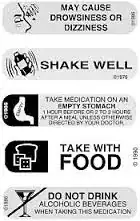The FDA requires labeling of prescription medications. Pharmacies will often attach a label on the bottle for patient-dependent behaviors. Therefore the easiest way (in the US) to tell if you need to take a medication with food or on an empty stomach is by reading the prescription bottle:

A patient can also ask for a package insert, which will contain much more information.
For OTC medications, a readable label is also required with quite a lot of the necessary information.
However, supplements are not governed by the FDA, therefore, the makers are under no obligation to include pertinent information, relying on the consumer to know the particulars for that supplement.
The only practical way to know whether your particular supplement should be taken with food is to look up that information yourself.
In the case of glutathione, for example, a reliable source of information will be hard to find, because anyone can make any claim about a supplement and often will (for monetary gain.)
Even so, there exist some resources, such as Examine.com and PubMed. From PubMed:
Research suggests that glutathione is not orally bioactive, and that very little of oral glutathione tablets or capsules is actually absorbed by the body.
So it doesn't seem to matter if it's on an empty or full stomach.
From Examine.com:
There is, currently, no known benefit of orally ingested glutathione that cannot be more readily mimicked by supplementation of N-acetylcysteine and couldn't theoretically be aided by a high protein diet including dietary sources rich in L-cysteine (whey protein).
However, for N-Acetylcysteine, Examine.com gives this advice:
Does Not Go Well With
- Activated charcoal (may reduce absorption of N-acetylcysteine)
as well as a lot of other information.
Examine.com is an interesting and promising site, but its editors aren't donating their time for the love on mankind only. It is a for profit company, but one that at least makes use of easily available scientific research.
This should not be seen as an endorsement. As the disclaimer on that site states:
Examine.com is intended to be used for educational and information purposes only. Examine.com and its Editors do not advocate nutritional supplementation over proper medical advice or treatment and this sentiment will never be expressed through pages hosted under Examine.com. If using any pharmaceuticals or drugs given to you by a doctor or received with a prescription, you must consult with the doctor in question or an equally qualified Health Care Professional prior to using any nutritional supplementation. If undergoing medical therapies, then consult with your respective Therapist or Health Care Professional about possible interactions between your Treatment, any Pharmaceuticals or Drugs being given, and possible nutritional supplements or practices hosted on Examine.com. (Etc.)
TL;DR: You're pretty much on your own as applies to this.
Drug Interactions: What You Should Know
glutathione at PubMed
Glutathione at Examine.com
